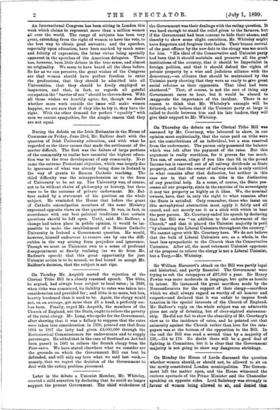On Tuesday Mr. Asquith moved the rejection of the Clerical
Tithe Bill in a closely reasoned speech. The tithe, he argued, had always been subject to local rates ; in 1836, when tithe was commuted, its liability to rates was taken into consideration and provided for; and tithe is no more, but less, heavily burdened than it used to be. Again, the clergy would not, on an average, get more than £8 a head, a perfectly use- less boon. Finally, urged Mr. Asquith, the members of the Church of England, not the State, ought to relieve the poverty of the rural clergy. Mr. Long, who spoke for the Government, after showing that it was a fallacy to suppose that the rates were taken into consideration in 1836, pointed out that from 1884 to 1897 the laity had given £4,000,000 through the Ecclesiastical Commissioners for endowments and to supply parsonages. He added that in the case of Scotland an Act had been passed in 1861 to relieve the Scotch clergy from the Poor-rates. We have stated elsewhere what we consider are the grounds on which the Government Bill can best be defended, and will only Bay here what we said last week,— namely, that we regret the decision of the Government to deal with the rating problem piecemeal.















































 Previous page
Previous page